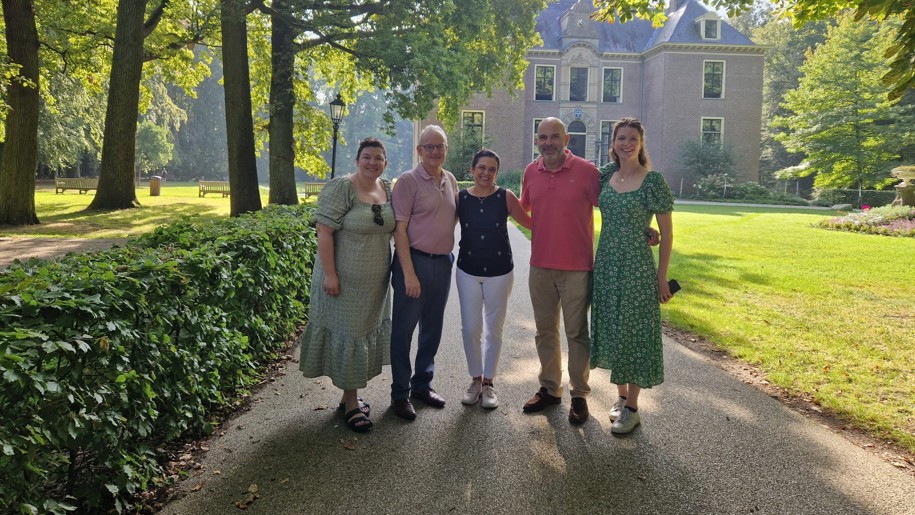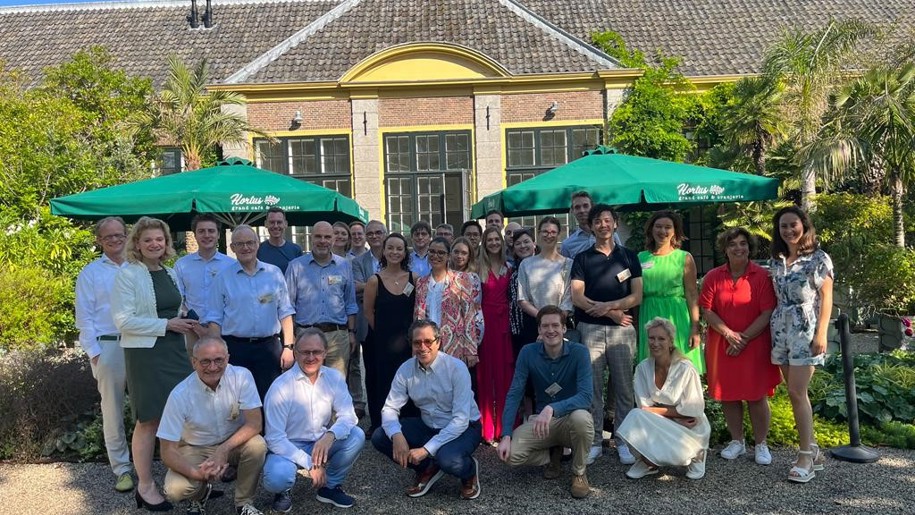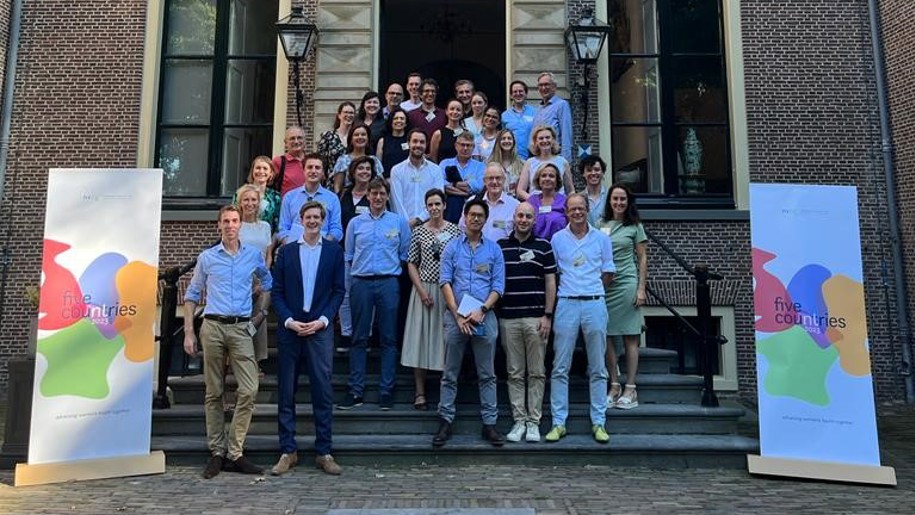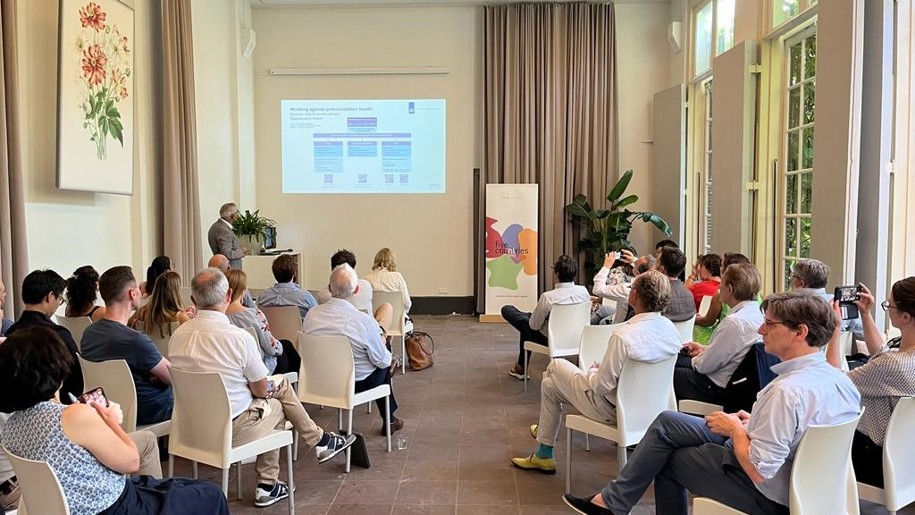Ursula Blyth and Naomi Harvey tell us about their experience of attending the Five Countries Meeting in Leiden in the Netherlands in September 2023 as part of their trainee bursary
Blog: Five Countries Meeting trainee bursary
Ursula Blyth
I had the privilege of participating in the Five Countries Meeting thanks to the RCOG’s Five Countries Meeting trainee bursary. This meeting was attended by O&G trainees and consultants from Switzerland, France, Belgium, Germany, Austria, the Netherlands and the UK. It was an enriching experience that offered insights into different healthcare systems and training programmes as well as the challenges and innovations within the field of obstetrics and gynaecology across Europe.
I was struck by the diversity in training programmes across the European nations, the intricacies of which were a core focus of this year’s meeting. The length of training varies considerably as do working hours and annual leave allowances. The European model tends to offer a five-year programme predominantly based within the same hospital and trainees need a high level of motivation to independently drive and shape their training in contrast to the more supervised curriculum in the UK programme. The RCOG training programme stood out for its thorough curriculum and well-structured digital portfolio.
Another intriguing discovery was that in Austria and Germany gynaecologists routinely manage breast examination, investigations and surgery. The inclusion of pelvic ultrasound as part of a standard gynaecology assessment of patients in Europe highlighted the potential gap in exposure and training in ultrasound scanning in the UK curriculum.
A trip to the Netherlands wouldn’t be complete without a group bike ride (slightly unnerving as the savvy Dutch cyclists sped past on their morning commute). On the second evening we had a brilliant canal boat tour of Leiden, accompanied by local delicacies. These activities provided an opportunity to socialise and build connections with fellow trainees as we discussed common issues such as burnout, workload and our thoughts on the future direction of training.
Leaving the conference, I couldn’t help but feel a sense of pride in the UK’s well-supported training programme. While there is always room for improvement, the RCOG’s comprehensive and structured curriculum clearly provides a strong foundation for the development of future obstetricians and gynaecologists.
The trip was a unique opportunity to connect with colleagues from different corners of Europe and to engage with RCOG leadership. The knowledge and experience I gained was invaluable for personal and professional growth and helped foster a sense of camaraderie within our European O&G community. I would encourage my fellow trainees to apply for any similar opportunities during the RCOG’s next annual award cycle.




Naomi Harvey
I had the great privilege of attending the Five Countries 2023 meeting, hosted by the Dutch Society of Obstetrics and Gynaecology (NVOG). Originally established as the Four Countries Meeting between the British, Dutch, French and German O&G societies, this year it was extended to include Belgian physicians. However, it unofficially became the ‘Seven Countries Meeting’ with trainees from Switzerland and Austria joining as well. The meeting aimed to discuss how each training programme is implemented, issues that affect delivery of training and how each European country can differ in regards to guidelines. Differences were openly discussed and how we can learn from each other was embraced.
I was very lucky to use some annual leave before the meeting and was able explore to Amsterdam for the first time during the September heatwave. After a few days, I arrived in Leiden to join the RCOG delegates: Ranee Thakar, RCOG President, Ian Scudamore, Vice President for Education, and Stergios Doumouchtsis, International Council Representative for Europe, and I was very grateful to have a buddy in Ursula, a fellow trainee.
The meeting was held at Oud Poelgeest, an incredible castle built in the 17th century. While the impressive setting would be attractive enough, the castle was chosen as it was the home of Herman Boerhaave, the famous Dutch physician. We were warmly greeted by the hosts and spent some time getting to know fellow trainees and specialists.
Each country had a trainee representative to discuss their programme and how they complete their training. I found many of the differences surprising and it was interesting to understand how the UK programme compares.
Many European trainees do not apply for a training programme, but instead apply as an individual to a hospital. Therefore, if they wish to move hospitals, they must either approach a contact or wait for a place to be advertised. This can lead to their training becoming centre-dependent. For example, if your hospital is obstetrically focused, this can be what you are trained in for years. In Germany, they described how many trainees are choosing to train as ‘community gynaecologists’. They finish after five-year and then mainly work in community- or ambulatory-based roles. I felt a newfound appreciation for the RCOG system and how training is so well established.
The Belgian trainees explained that every delivery is attended by a consultant. The trainees finish medical school and go straight into a five-year residency in O&G, with CCT at 28 years old. During their residency, the trainee delivers every vaginal birth and asks their consultant to be present. The midwives perform first-stage care but do not lead on the delivery except in the case of a multiparous patient.
The use of forceps seems to be a more contentious topic in mainland Europe. For example, Austria has a 0% forceps delivery rate and views the use of episiotomy as increasing the rate of OASI. I found this a very shocking statistic, considering they have a caesarean birth rate of 23%. They have an elective caesarean list once or twice a week. I feel the competencies linked to ‘independent working’ on the labour ward have greater importance in the UK.
Finally, with the ongoing industrial action for pay restoration, salaries can vary greatly throughout Europe. For French trainees, their take-home salary would account for approximately half of the UK wage. However, as the majority of systems are insurance-based, salaries can be boosted through public work and surpass consultant salaries in the NHS.
While our differences are there, the fundamentals of care remain the same. The future of gynaecology with a focus on laparoscopic and robotic skills is established throughout the majority of countries. Furthermore, the ethos of putting women and birthing people as the pinnacle of our care was the evident focus of each nation.
I would like to thank the RCOG for such a wonderful opportunity and encourage trainees to apply for any similar opportunities arising in the future. It is eye-opening to meet your European counterparts and an excellent way to make many lifelong friends. I also cannot thank the Dutch hosts enough for an incredible trip where we were lucky enough to stay in a 17th-century castle, cycle to beautiful botanical gardens, enjoy a boat trip through Leiden and be treated to fine dining experiences. It was the study leave of a lifetime!
Find out more about the Five Countries Meeting trainee bursary here.
